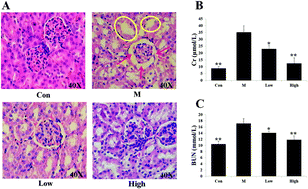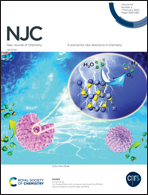Oleanolic acid derivative isolated from Gardenia jasminoides var. radicans alleviates LPS-induced acute kidney injury in mice by reducing oxidative stress and inflammatory responses via the TLR4/NF-κB/NLRP3 signaling pathway
Abstract
Acute kidney injury (AKI) is a frequent complication of sepsis with hallmarks including inflammation and oxidative stress. A large amount of oleanolic acid derivatives (TO) have been isolated from Gardenia jasminoides var. radicans, a traditional Chinese medicine with anti-inflammatory efficacy; thus, the aim of the present study was to evaluate the protective effects of TO on injury in a murine model of endotoxemic AKI. Kidney function, inflammation, oxidative stress, apoptosis, white blood cell count, TLR4/NF-κB/NLRP3 pathway involvement and metabolic profiling of the serum were evaluated. The results show that TO significantly ameliorated renal function in mice with LPS-induced AKI; 2-deoxy-D-glucose (2-DG) optical probe imaging indicated that TO markedly reduced the levels of inflammation; flow cytometry demonstrated that TO had an excellent antioxidant effect, regulating immune cells; Western blotting indicated that TO inhibited the TLR4/NF-κB/NLRP3 signaling pathway; and metabolic profiling of the serum also demonstrated the protective effects of TO on injury in a murine model of endotoxemic AKI. In summary, TO renoprotection involves the attenuation of LPS-induced renal inflammation and oxidative stress, which may be mediated via inhibition of the TLR4/NF-κB/NLRP3 signaling pathway.



 Please wait while we load your content...
Please wait while we load your content...